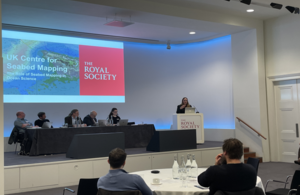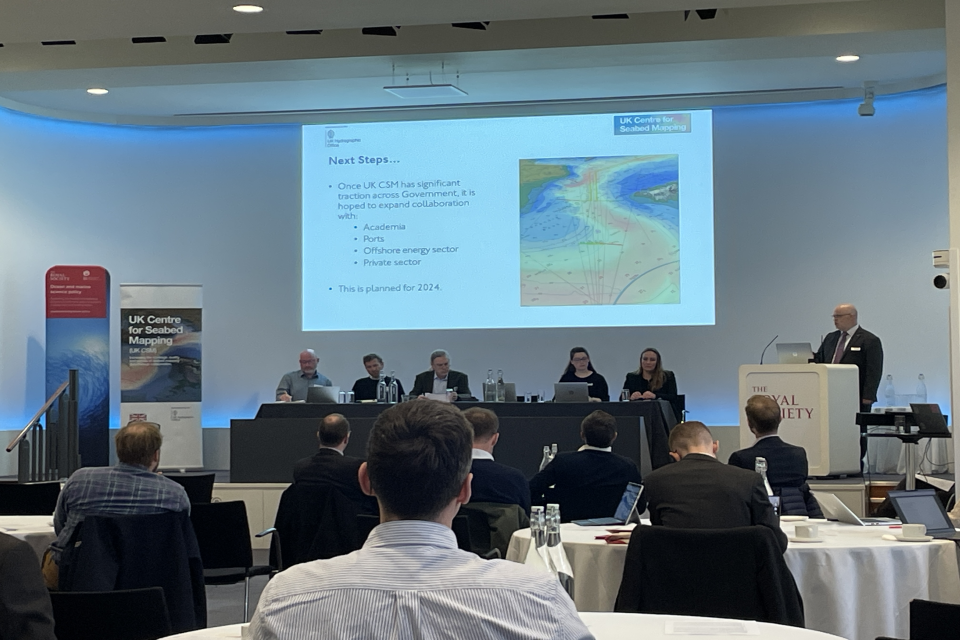The Role of Seabed Mapping in Ocean Science
The UK Centre for Seabed Mapping (UK CSM) programme team co-hosted an event with The Royal Society to explore the vital role of seabed mapping in ocean science.

Held at The Royal Society’s headquarters in London in March, the day included the UK CSM’s sixth Management Group meeting, with representatives from the centre’s members, which has now grown to 33 organisations with a common interest in working towards improved seabed mapping of the UK’s marine estate.
Academics from the seabed mapping community, as well as Early Career Researchers (ECRs) and Early Career Ocean Professionals (ECOPs) from The Royal Society’s Ocean & Marine Science Policy Programme’s prestigious network, also joined UK CSM members.
At the Management Group meeting, attendees discussed the future workforce of seabed mappers, ocean literacy in education, outreach strategy and initiatives such as World Ocean Day.
MEDIN (the Marine Environmental Data and Information Network) also presented their work on Making UK marine data available to the UN Ocean Decade relating to Challenge 8, which is to “Create a digital representation of the ocean”.

The UK CSM to report to Coast and Ocean Applied Systems Thinking Group (COAST)
Rory Shepherdson from the UKHO’s Public Sector team delivered an update on the recently established reporting mechanism from the UK CSM up to the Coast and Ocean Applied Systems Thinking Group (COAST), whose UK Government Chief Scientific Advisors convene to enable cross-governmental ocean and marine science.
Dr Antony Firth, Head of Marine and Coastal Heritage at Historic England, delivered the keynote presentation. Dr Firth highlighted the intrinsic link between the UN Decade of Ocean Science (2021-2030) and seabed mapping, which runs through every one of the challenges and the desired outcomes from the Ocean Decade.
Illustrated with several fascinating examples, Dr Firth explained the vital relationship between seabed mapping and all marine heritage activities. Whilst seabed mapping can be a challenging and costly enterprise, it delivers a positive return on investment, economically and environmentally, as well as in its heritage value. He also reminded attendees that only 26% of the UK EEZ (Exclusive Economic Zone) is mapped to modern standards, falling to just 2% when including the UK Overseas Territories.
How seabed mapping can support ocean scientific initiatives and the UN Ocean Decade
In the final session, some of the attending ECRs and ECOPs presented their work in 5-minute ‘lightning talks’ to the UK CSM members. Across a wide range of subjects, the audience learned how seabed mapping interrelates with other ocean scientific initiatives which aim to support the UN Ocean Decade.
The presenters covered a breadth of topics that spanned seabed mining, temperate reef mapping and fisheries management, finding space for offshore wind in the UK’s EEZ, beach morphodynamics and sediment mobility concerning benthic habitat mapping and the effects upon algae populations, modelling the ‘white ribbon’ of nearshore waters, and work to understand the ocean carbon sink.
What is the UK Centre for Seabed Mapping trying to achieve?
To support a more integrated Marine Geospatial Sector for the UK, both nationally and internationally; increase the coverage, quality and access of seabed mapping data, as well as better promote it as a critical component of national infrastructure.
The day was an outstanding reminder of the sheer breadth of the value that seabed mapping can deliver to ocean science. We are very grateful to The Royal Society for co-hosting this event, held in conjunction with their Ocean and Marine Science Policy Programme, which aims to facilitate knowledge transfer between academia, policy and industry. This goal also reflects the ambitions of the UK CSM in the months and years ahead.
What are the next steps for the UK CSM?
For its next steps, the UK CSM is looking to involve academic institutions delivering seabed mapping education as expert contributors to an Education and Research Working Group this summer. The group will review education capacity in seabed mapping and how the UK CSM and its members can better support the UN Ocean Decade.
We hope the centre will expand to incorporate industry, such as ports, and the offshore energy sector as ‘expert contributors’ from 2024 onwards.
Improved collaboration across a diverse group of stakeholders is one of the goals of the UK CSM. Events such as this co-hosted event with The Royal Society are a great example of how all interested parties in the marine environment community can share and access marine data sources and, in so doing, work together to build a better understanding of our oceans.